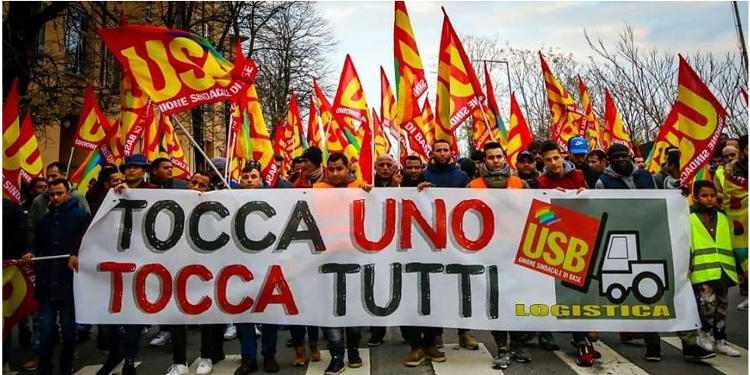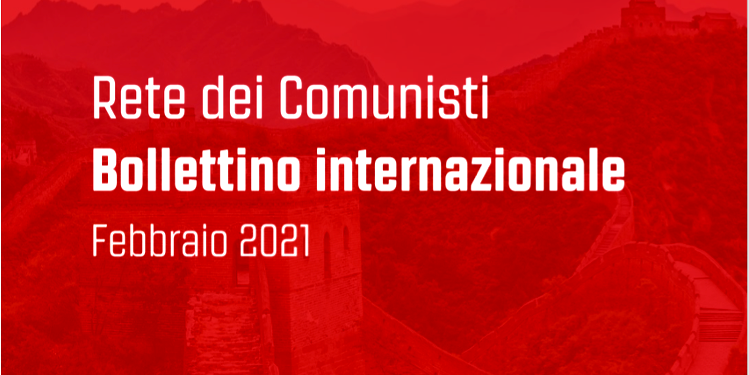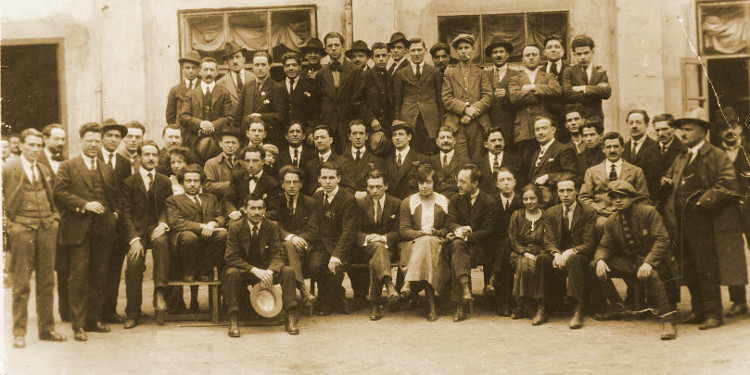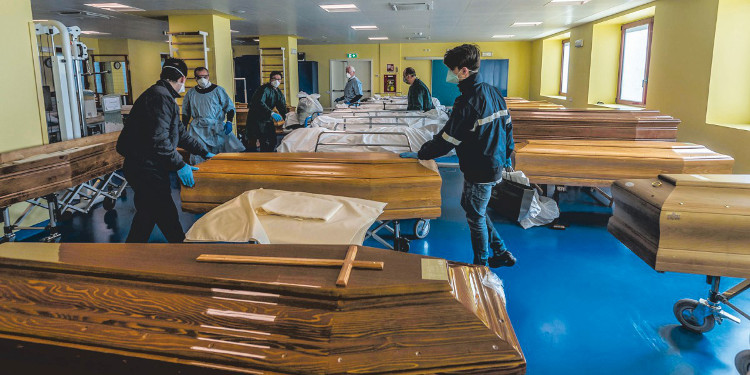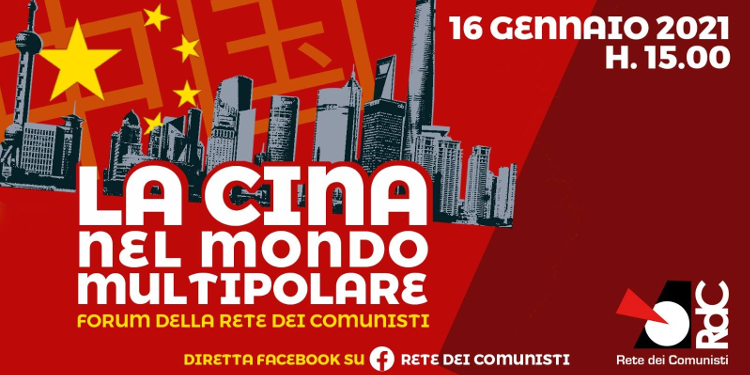| english | español | français | italiano |
Interview with Roberto Montanari (USB Logistics)
On Saturday 19 December, a crowded national assembly of workers delegates in the logistics sector was held in Rome, where the situation of the sector was outlined and the challenges that the union will have to face, or is already facing. As Rete dei Comunisti we interviewed Roberto Montanari of USB Logistics who opened the assembly.
– Q: In your opening remarks you summarised the transformational processes of what you rightly called “a segment of the value chain”.
Can you summarise the overall reconfiguration of the sector?
– A: The capitalist restructuring that has taken place since the 1980s and is still ongoing has affected the mode of production, the processes of accumulation and those of domination. There are three aspects that govern the search for maximum profit today: fragmentation, speeding up time, and power in the conflict and over class. In addition to lowering labour costs by locating them in places where there is less protection from trade unions, productive relocations also have the result of segmenting the social actors of production, making it difficult to recompose them and thus undermining their conflictual power. The segments of the value chain that remain at the heart of the empires (essentially the movement of goods through the various stages and their distribution) are asked to substantially homologate to the models implemented in the delocalisations to which all possible measures are applied to break conscience and antagonistic practices.
The perverse system of public contracting, the precarisation of the labour market, the Salvini decrees, illegal recruitment of labour and other similar measures serve to make the rotation cycle of capital competitive, fast and well controlled. The legislation on contracting out already embodies the vision of a stratification in which there are A series workers – those employed by the buyer (the actual owner) – who are in charge of the core business and B series workers (employees of service providers, the ‘contractors’) who are in charge of related activities. In both cases, different contractual conditions are constantly applied, always downwards in the case of contractors (poorer CCNL, less allowances, less incentives, less benefits); if they have the legal form of a co-operative, it is certain that sick leave will not be paid in the amounts due by the employer. In this way an initial form of savings is achieved. But contracts are also the shelter behind which clients can hide, leaving service providers to do the dirty work of undeclared wages, the outright theft of holidays, severance pay and wages, the most brutal authoritarianism, and the precariousness inherent in fixed-term contracts or the fears linked to contract changes.
In the pandemic context, logistics is refining its strategies for a further leap forward to implement “last mile” distribution, that of home delivery, the result of the explosion of online commerce, with innovation in the distribution of fresh food and pharmaceutical products. Major investments are planned both in structures (20% more warehouses to be built this year) and in equipment: sorters – which sort products according to their destination – and intelligent roller conveyors that read package barcodes, self-propelled vehicles and arms without drivers, and apps to control handling and individuals. Costs that will be amortised by the demand for an exponential increase in individual productivity, as in the case of Amazon, which is agreeing with concerted unions to increase the working hours of drivers for the same wage.
– Q: USB is increasingly characterising itself as a trade union subject with a wide range of instruments of struggle that go from the street to the courtroom.
It has succeeded, in a difficult context, in declining the forms of conflict, circumventing even those limitations that seemed to undermine its action.
Among the union’s proposals there are some that take on an exquisitely political significance and that indicate that the issue of logistics goes far beyond the individual victorious disputes that the USB has conducted so far.
I am referring to state planning to give a public profile back to some of its strategic supply chains, or the legislative proposal to be drawn up to abolish the contract system
What are the reasons that prompted the union to make this kind of ‘leap’ in its overall proposal?
– A: The practices of struggle have represented a field of true joint research, analysis and reflection that have valorised workers’ creativity because they are the result of autonomous choices of the workers based on the awareness of what is at stake in every single conflict and of the knowledge of the production processes, of the nerves to be hit. The change of pace concerns the shift of the baricenter of force; while before we reasoned more on the effectiveness of external contributions to the warehouses (the garrisons at the gates of supportive comrades who came from other realities), now we focus on internal relations of force: an entire department, an entire process, the entire warehouse that stops.
These are practices that bypass or limit the damage of repression and that are in any case combined with the solidarity of production chains, families, comrades and comrades of the movement and are synergistically supported by the offensive of the excellent, really excellent, legal sector of USB. This is a pool of labor lawyers, criminal lawyers, civil lawyers who are working on a draft law on contracts that will stuck them to some pivots able to make them less convenient to the bosses in their plans for cost savings and maximization of precariousness.
Let’s be clear: USB remains firm in the strategic objective of overcoming the system of contracts, but acts a “strong reformism” in the logic of accumulation of forces for that result
The same ‘strong reformist’ logic lies behind the idea of a planned economy, a need that the pandemic crisis has clearly highlighted. Liberalist and privatising policies have been brought to their knees by the Covid, and those countries that have practised them have been highly effective in combating contagion. There is a need for a renewed public commitment to the economy in order to sustainably produce socially useful goods; the public must return to reinvesting in health, knowledge, transport and services (from housing to citizenship rights) in order to escape the disasters that epidemics, climate change, environmental crises and the bulimia for profit create. In this sense, the logistics segment is fundamental for planning policies that are not subject to speculation.
Thinking about the nationalisation of logistics chains handling food and pharmaceutical products is not an ideological delusion
Let us look at what is happening with the distribution of vaccines. Beyond the problem of intellectual property, there is the issue that controlling handling and distribution represents the power to ensure fairness and universality in access to a good or its opposite: discrimination for the sake of profit.
In the Italian port system we then see the fragility of liberalist policies. Public money is used to build ports with infrastructures for large container ships, as in Trieste, and once they have been unloaded there, the Austrian railways come and take them (by road) to their country. The added value that the Italian state puts into that port benefits both the public and private systems on the other side of the Alps. I repeat, this is not ideology, but nationalising port logistics is a good way of investing the country’s resources.
– Q: During the struggles in logistics in recent years, there have been many episodes of confrontation, even harsh ones. Assaults against trade unionists and striking workers, police charges and arrests, court cases. And deaths. Like Abd Elsalam Ahmed Eldanf, Usb trade unionist crushed by a truck on 16 September 2016 during a garrison at Gls in Piacenza. He was 53 years old and had five children.
The union paid a hard price in terms of repression regarding the actions taken: from imprisonment to denunciations to forced repatriations of immigrant workers. In a climate of overall authoritarian torsion in the dark Italy of the 21st century, do you think that the proposal for an amnesty for political and social crimes could help to widen the ever narrower margins of trade union-political action that the elites would like to impose and reverse the criminalisation of social conflict that we are going through?
– A: I am absolutely in favour of it, and in the spirit of the debate that led the Constitution writers to enshrine the right to strike. It is true that it was a mediation solution between socialist and liberal thinking, which left the regulation of the right to the laws (which are still lacking) and not to the Constitution alone, but it sanctioned a principle: the workers in the conflict with the bosses are the weak party that must be defended and in fact the right to strike is foreseen for them and not for the employers (the blockades are indeed prohibited). We must rebuild the vision that those who fight for their rights, for the good of a community, do not commit a crime. Those who are weaker must be put in a position to contend with equal means. I block a road, I occupy a house, I stop a work that is devastating for the environment because you, the owner, block my possibility to feed a family, to have a roof over my head, to have breathable air. Who commits the worst action?
– Q: The confederal unionism project of the Unione Sindacale di Base is attracting more and more portions of the logistics sector from the CGIL. The latest and most important ‘defections’ were the joining of the USB at the end of October by the Collettivo Autonomo dei Lavoratori Portuali of Genoa – a historic militant experience in Italy’s largest port – and that of the Lazio logistics workers in the following months.
It is clear that workers in the sector are increasingly facing a triple enemy: bosses, contractors and corrupt unions
What do you think are the reasons for them not only to cut the link with the CGIL but to move towards USB?
– A: It must be said that in Italy the political and social forces that have been the reference point for the working-class and popular movement have undergone a monstrous mutation, worse than anywhere else on the planet, and this has produced the devastating results we are witnessing and which are slowly becoming apparent. In the systemic crisis, capital grinds bodies and consciences in order to stay afloat, but ends up upsetting even the “ants” in their own small way.
And so USB comes into play, in the extreme difficulties of the times, but it comes out.
I believe that USB stands out for some of its characteristics:
1. it is a fighting and class union, it focuses on policies in favour of the workers not the economy of the bosses,
2. it is democratic, decisions are taken collectively,
3. it is confederal, uniting the differently oppressed,
4. it is competent, it makes various knowledge and experience available to those who fight,
5. it is honest, it practices “todo para todos, nada para nosotros”,
6. it is within the FSM, it is a worldwide trade union that connects the different segments of the value chain.
– Q: The various figures of workers who make up the logistics chain have become paradigmatic with regard to the overall condition of the exploited, also because of the increasingly significant numerical portion that they have assumed in the new class composition.
They constitute neither more nor less the laboratory for the forms of exploitation of the future for the whole class
How can the struggles of the logistics sector be concretely intertwined with those of other parts of the union such as the Social Federation, or those of workers in the agribusiness sector?
– A: We have partly seen the lines of connection: the fight against precariousness, the overcoming of the contract system, public intervention in the economy, the defence of democracy are unifying grounds, just as the ‘value chain’ is unifying, representing a framework in which production, handling and distribution are included. In other words, the struggle of a nurse or a bus driver finds in the porter who is a user of those services a safe ally, just as the precarious musician or the museum guide have in common with the driver the struggle for a stable and justly paid job. Similarly, the demands of the tomato picker and the supermarket cashier should be put together and strikes organised on the same day for both.
However, one area that we need to test is the link between working conditions in logistics and cities. To make it clear: transportation activities have a strong impact on the territory, both from the urban point of view, with the sealing of millions of square metres of land, and from the environmental point of view, with very high emissions of particulate matter and fine dust. We need to build a pact that translates environmentalism into a social sense. A driver who has to travel more slowly with small vehicles in urban centres is a driver who has fewer loads to deliver, who drives more slowly, for the same wage, and who pollutes less. It is an example, but we should think about it.
– Q: The initiative that the USB is carrying out in the logistics sector is both the result of intense organisational activity within the ranks of workers and of a precise analysis to which the organisation has dedicated itself together with the Centre for the Study of Economic and Social Transformations (CESTES).
This interweaving of direct union action and investigation seems to be the added value that the union offers its militants in order to understand a world in continuous transformation
What weight does training have in those ‘heavy jobs’ – as you yourself have defined the challenges facing union delegates and activists in this phase?
– A: It is a fundamental question that of the training in a new class segment, which has the characteristic of being composed almost predominantly of the migrant proletariat and which has entered a sector in which there was no “expert” class stratum capable of directing and carrying out political pedagogy.
However, I remain of the opinion that the real work to be done is the formation of class consciousness, of the awareness of one’s own historical role
You need to know contracts, workers’ statutes, security decrees, but much more to embody the values of social justice and equality, which are what make you perceive yourself as a delegate or an honest, serious, generous activist.
In this sense, I remain attached to a fundamental principle of laborist thought: consciousness is determined by conflict, and it is in struggle that it is valorised. In this however there are no training courses, there is a problem of subjectivity, this is the great work that we have to do in this country, and not only for delegates.

